
US-China Trade War Escalates: Beijing Strikes Back with Tariffs
The US-China trade war is heating up once again. The United States has imposed a hefty 125% tariff on Chinese imports, sparking a strong retaliation from Beijing. In response, China has imposed an 84% tariff on US goods, further intensifying the ongoing tensions between the two global powers.
Beijing’s Foreign Ministry spokesperson, Lin Jian, didn’t mince words, stating, “The US cause doesn’t win the people’s support and will end in failure.” This remark shows China’s resolve to stand firm against what it calls “unilateralism and economic bullying” by the US. But how will this escalate, and what does it mean for global markets?

Key Developments in the US-China Trade War
Global Diplomatic Push
China has made its move to rally international support. It’s courting the European Union (EU), the Association of Southeast Asian Nations (ASEAN), and other global players. China’s strategy is clear: isolate the US and present its tariffs as unjust and damaging to global trade.
Premier Li Qiang recently held talks with EU Commission President Ursula von der Leyen, strengthening ties between China and the EU.
Meanwhile, China’s Commerce Minister Wang Wentao has accused the US of violating World Trade Organization (WTO) rules by imposing such high tariffs. This diplomatic push highlights Beijing’s determination to counteract the US’s stance and secure allies in the global economy.
Also Read: U.S. Tariffs on China Soar to 125%—Goldman Sachs Warns of Fallout as Global Markets React
Mixed International Response
Not every country is on Beijing’s side. Australia has chosen to stay neutral, with Prime Minister Albanese stating, “We stand on our own two feet.” The Australian stance may be due to the country’s strong economic ties with both China and the US.
In contrast, India has turned down China’s invitation to join its alliance against the US. Despite China’s calls for unity among Global South nations, India prefers to maintain its independence in global matters, emphasizing non-alignment.
Taiwan, a flashpoint in the region, is also affected. Facing a 32% tariff from the US, Taiwan is planning direct negotiations with Washington, signaling a potential shift in trade dynamics in the Asia-Pacific region.
Also Read: Australia Snubs China’s ‘Join Hands’ Plea Amid Rising US Tariffs
Market Reactions to the Escalating Tensions
The financial markets have reacted in mixed ways. On one hand, global stock markets showed optimism after the US announced a 90-day pause in tariffs for most countries, except China. The Nikkei 225 rose by 9%, and the DAX in Germany surged 7.5%, signaling a brief respite in the trade chaos.
However, the Chinese stock market has not shared the same level of enthusiasm. The CSI 300 index climbed by just 1.3%, and the Hang Seng gained only 2.1%. These modest gains reflect the uncertainty surrounding China’s long-term position in the trade war. Investors are cautious, worried about the prolonged effects of high tariffs and the shifting global trade landscape.
China’s Defiant Stance
Despite the international push for talks, China has made it clear it is not willing to negotiate under the current conditions.
Beijing insists that it will not sit down with the US unless there is “equality and mutual benefit” in the discussions. This position has been echoed in a recent Hong Kong op-ed, reinforcing China’s unwillingness to back down without significant changes to US trade policy.
China’s strategy now seems to be bypassing Washington and looking for new partners. This diplomatic push is crucial, but it remains to be seen how successful China will be in rallying the global community against the US.
Russia and India remain neutral or unaligned with China, making the diplomatic landscape even more complex. Without strong backing from other major economies, China’s plan to isolate the US faces significant challenges.
The US-China trade war continues to evolve, with each side digging in its heels. As tariffs rise, both countries will likely face economic challenges, but the broader impact on global markets and diplomatic relations will unfold in the coming months. For now, Beijing’s defiance and diplomatic efforts reflect its determination to stand strong against US pressure.
The international community is watching closely to see whether this trade conflict will escalate further or if a resolution can be found. Regardless of the outcome, the US-China trade war has already reshaped the global economic landscape, and the repercussions will be felt worldwide for years to come.
Also Read: AUKUS Nuclear Submarine Deal Faces Backlash Over China Conflict Silence












